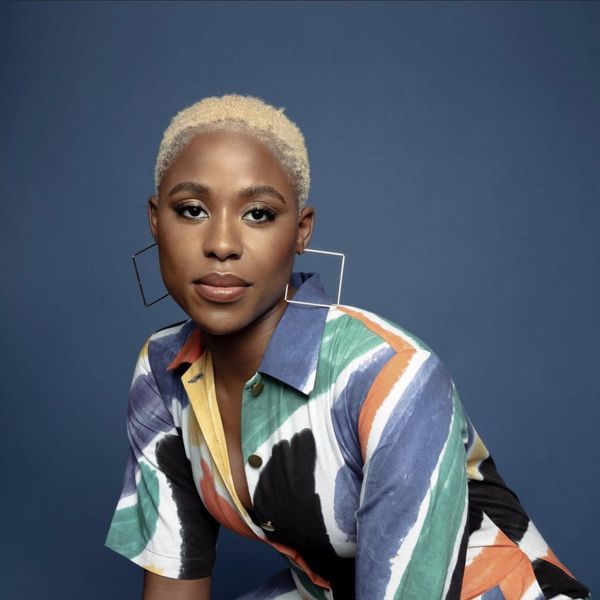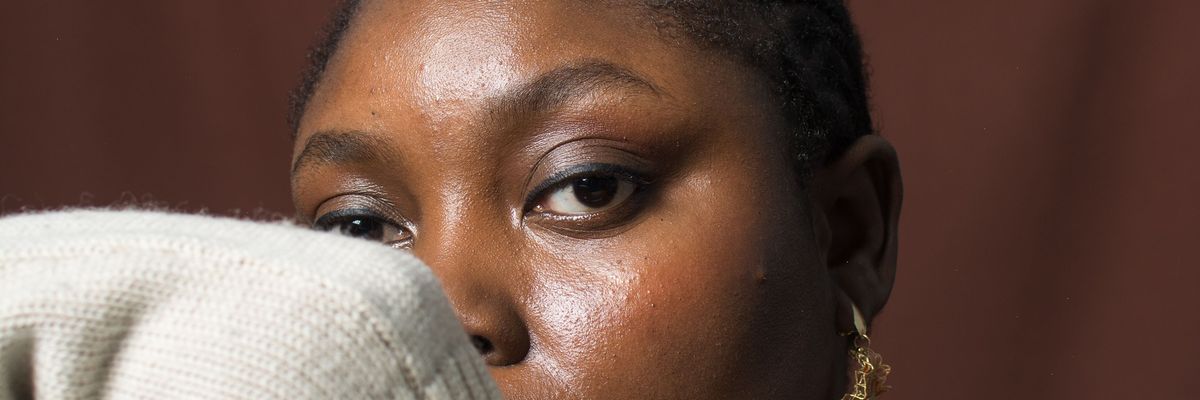Y'all remember the show Girlfriends? It was my first introduction to what my 20s could possibly look like with my closest friends. For me, it was a nice dream for little ol' me to look forward to when I grew up. Now that I’m grown, honey, adulting is not a joke. There are many responsibilities to have, mistakes to make, and breakups to recover from. It is a struggle but a beautiful one. Today, there are a few shows that still highlight amazing Black women living their lives and navigating the ups and downs with their day-ones by their side.
These are the types of shows that remind us that while we all have our not-so-good moments, our girls are there for support, making life just a little bit easier. If you haven’t heard, there's a fairly new Amazon Prime series, created and executive produced by Tracy Oliver, called Harlem. This series is a comedy narrated by a character named Camille (played by Meagan Good) and includes her three best friends as they navigate their 30s in Harlem, N.Y.
One of the three best friends is Tye, a queer woman who left the corporate world and created her own dating app for LGBTQAI+ people of color, and she's played by the vibrant and loving actress, Jerrie Johnson. I figured it was only right to have a chat with Jerrie for an exclusive xoNecole interview and get to know the woman behind the Harlem series' tech entrepreneur.
xoNecole: [In 'Harlem'], we definitely see Tye's development throughout the show in her portrayal of what it looks like to show up for yourself and your friends. What's an important lesson you’ve learned about showing up in your own personal life?
Jerrie Johnson: Well, I’m a very drop-everything-for-someone-who-is-going-through-something type of girl. Literally last night, I was preparing to wash my clothes. My friend was having some issues and I felt she wasn’t in the best headspace. I got dressed, met up with a couple more of our friends, and we all went down to Brooklyn to see her. Now, mind you, I live in Harlem. People ain’t just hopping over to Brooklyn any given day. Now the thing with [my character] Tye is, she's really good at setting boundaries.
She mentions in a scene that she is not comfortable to share her business contact with her friend. For me, I would have been quick to text it for my friend without even thinking about it. Not to say that what Tye did in that moment was wrong or right. It’s just something that I am incorporating into my life now. Showing up for people differently than they show up for you doesn't make you a bad friend. You may not always be able to just get up and go to Brooklyn when your friend is in trouble. So, I am learning to show up by setting more boundaries.
"Showing up for people differently than they show up for you doesn't make you a bad friend. You may not always be able to just get up and go to Brooklyn when your friend is in trouble. So, I am learning to show up by setting more boundaries."
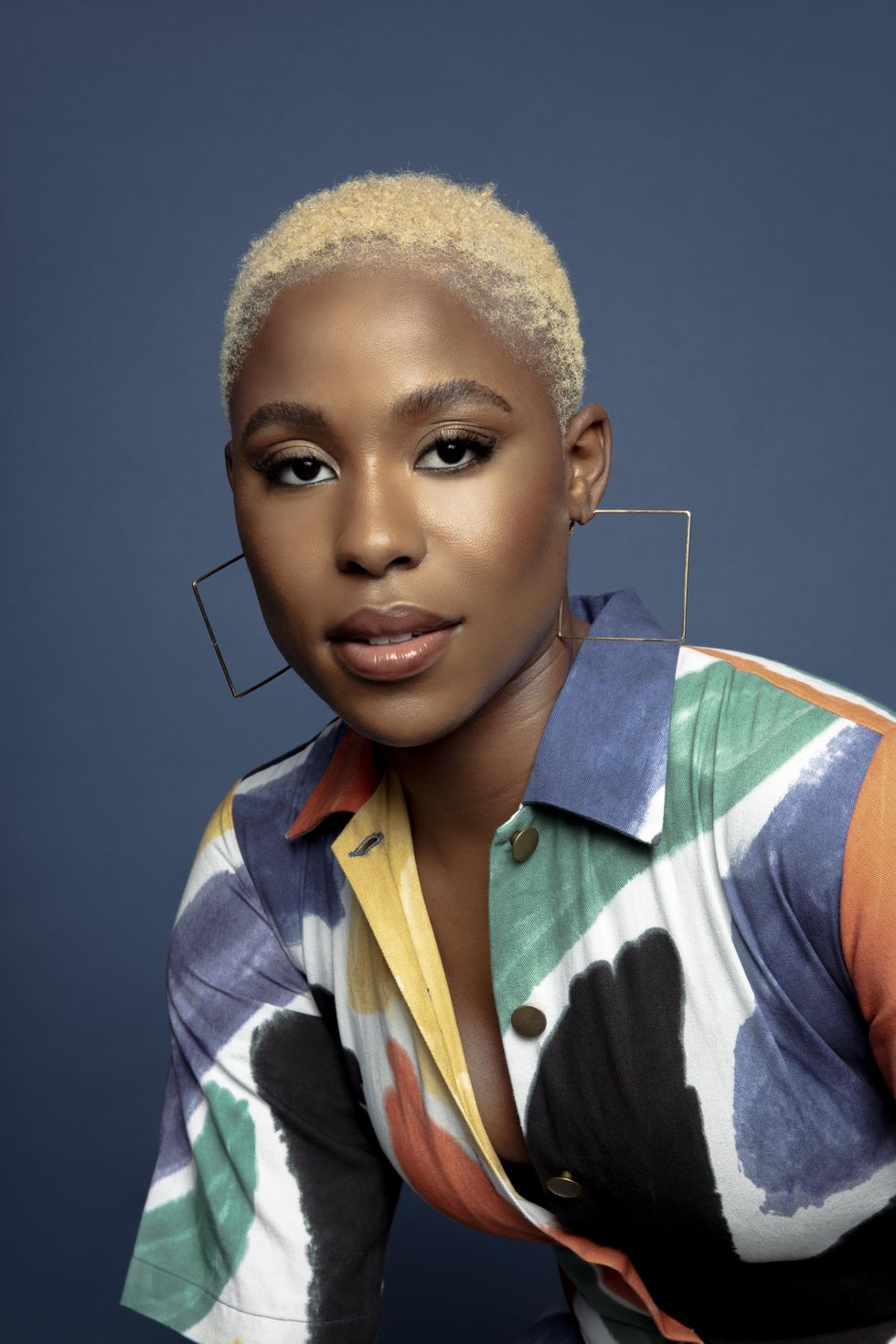
Cecile Boko
The show also talks about the trope of being a strong Black woman. There's a moment where we see Tye not wanting to be seen as weak by her friends. Are there moments during your day where you put self-care at the top of your to-do list?
There have been multiple moments in my life where I have learned to prioritize self-care. One example is when I was in undergrad, I was in a lot of activities. The amount of things I juggled with the amount of time I had still baffles me to this day. This was around the time of the Michael Brown incident, and I personally couldn’t even get out of bed. It was probably a combination of exhaustion and depression. There is a thing that happens with my body when I am exhausted. I start to lose my voice, so when that happens, I [know I] need to slow down.
What is real for me is that I like to show up 100 percent in every room I am in, but sometimes I have to gauge the amount of energy I can realistically give. I say to myself, 'Alright Jerrie, we only have 20 percent to give right now.' My body has been trained to go to that 100 percent level, but I have to reel it in and only give the 10 out of the 15 percent or just the 20 percent.
Admittingly, there is a guilt that we, as Black women, feel when we practice the act of self-choosing. What advice do you have for other women who struggle with saying the word “no”?
When a person first starts to create boundaries, guilt is a normal response, so don’t feel guilty about feeling guilty. I would say the first thing you should do is forgive yourself for the moments that you didn’t put yourself first. The second thing I would say is to recognize what the [reason] is for feeling that you cannot set boundaries. I am one of eight children—seven who are still alive—and I grew up in a household where my mom didn’t hug me. My mom didn’t come to my shows or give me that kind of support others seek from their parents.
Because of that, I overcompensate support and do not want people to feel the way I felt growing up. I leave myself on the line for others more than I should. It’s really about healing those childhood traumas to understand why we do the things we do. We like to celebrate people who are caregivers and people-pleasers. There is nothing wrong with tending to other people’s needs, but if it means leaving yourself in the dust, then it does turn into something that’s not okay. Lastly, empower your 'no.' Be proud of your 'no.' Practice saying 'no,' and revel in that good feeling you get after you say it.
"There is nothing wrong with tending to other people’s needs, but if it means leaving yourself in the dust, then it does turn into something that’s not okay. Empower your 'no.' Be proud of your 'no.' Practice saying 'no,' and revel in that good feeling you get after you say it."
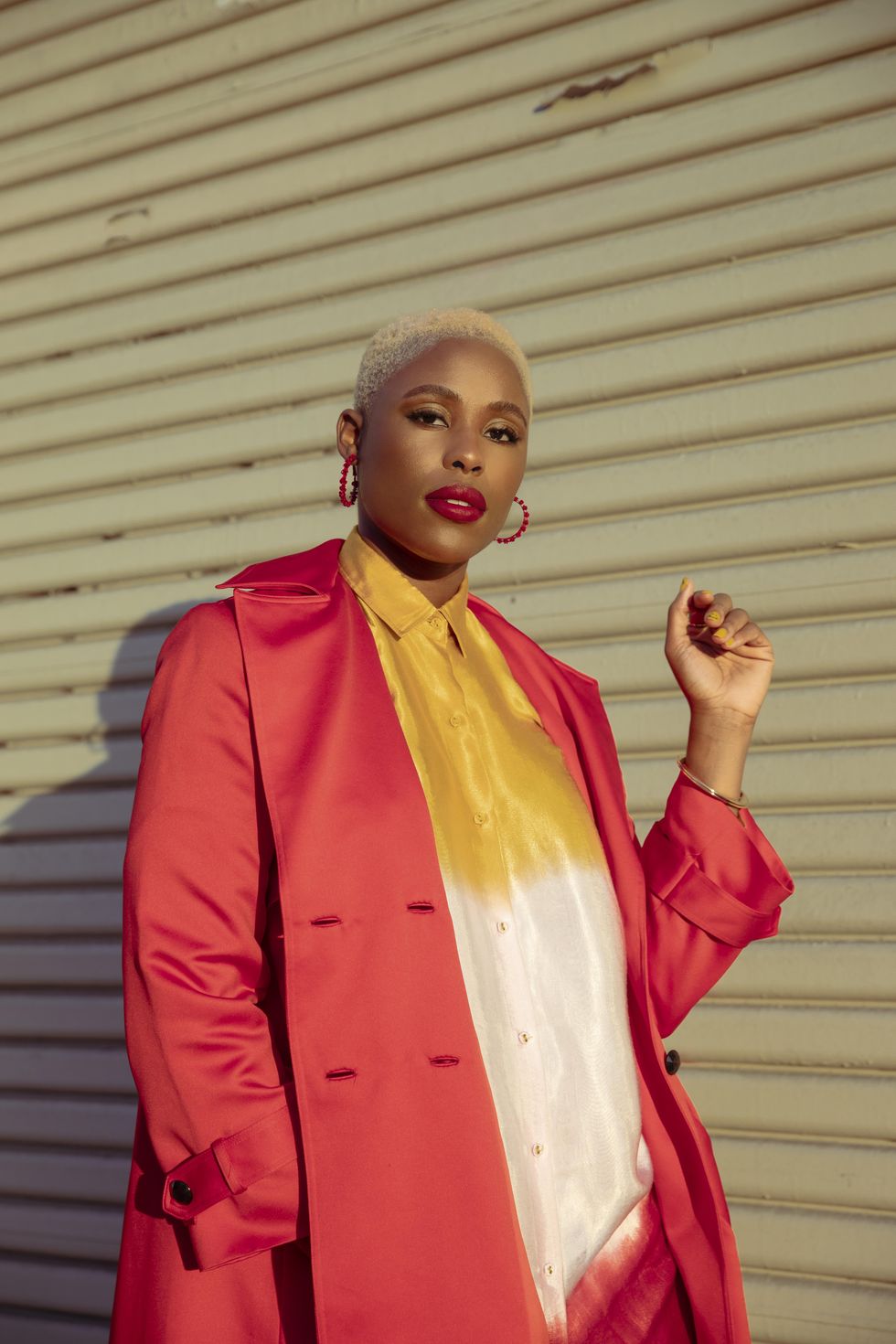
Cecile Boko
In the series, we see how important it is to have a sense of community as you navigate through life. How important is it for you to have your main tribe or crew?
Growing up, I didn't really have a clique nor was I ever a cliquey person, so, when I was in undergrad, I yearned for that. You hear the stories from other people stating that they have been friends since their freshman year of college or they go on vacations together—you know, stuff like that—and I didn’t really have that. Now I have friends. But most of my friends already have their friend groups, and I’m like the plus one. So to be a part of the group now, with the friends I mentioned before, allows me to really appreciate adult authentic relationships. It is near and dear to my heart.
Life isn’t always easy, especially when you are juggling a career in the entertainment industry. When you feel overwhelmed, or you don’t feel at your best, how do you usually handle it?
Well first, I listen to a ton of Abraham-Hicks videos and that gets me in my bag! Then I like to listen to a playlist of my favorite songs that I know are going to get me out of the funk. I also try to write things out since I’m a writer as well. But if there’s any resistance to the first few things, I practice tapping, and I recite affirmations for myself. I will say things like, "I am feeling really unbalanced right now, but I love and accept myself." After that, I feel so much better.
Let's talk about the importance of wellness and self-care again. How has practicing self-care helped you become a better person as well as a better actress?
My favorite type of self-care is watching my campervan shows. I like to light my candles and maybe indulge in some vegan ice cream. I love HGTV, interior design videos, and I am obsessed with watching people create their own campervans and go off the grid. I think, when it comes to self-care, when we do certain things because it works for other people and it doesn’t necessarily work for us, we get further away from our true essence. If my first instinct is to go on YouTube and watch a campervan video, I can’t judge myself for it. I can’t say, “Jerrie, you can’t watch a campervan video for self-care. That is so weird. You should be taking a bath instead, or [to] do some yoga.'
If I end up doing yoga, I know deep down it’s not my truest desire. My philosophy is to always follow my desire. If I do what I desire for self-care, when I get a script or I’m on set, I’m not judging my instincts or desires for my character, either. It just helps me not to put restrictions on Tye or any other character I play. People do weird things. I know I do weird sh*t all the time and that’s okay. If I were to put limitations on Tye, it would have closed the box of all the possibilities there are for her to be.
"My philosophy is to always follow my desire. If I do what I desire for self-care, when I get a script or I’m on set, I’m not judging my instincts or desires for my character, either. It just helps me not to put restrictions on Tye or any other character I play."
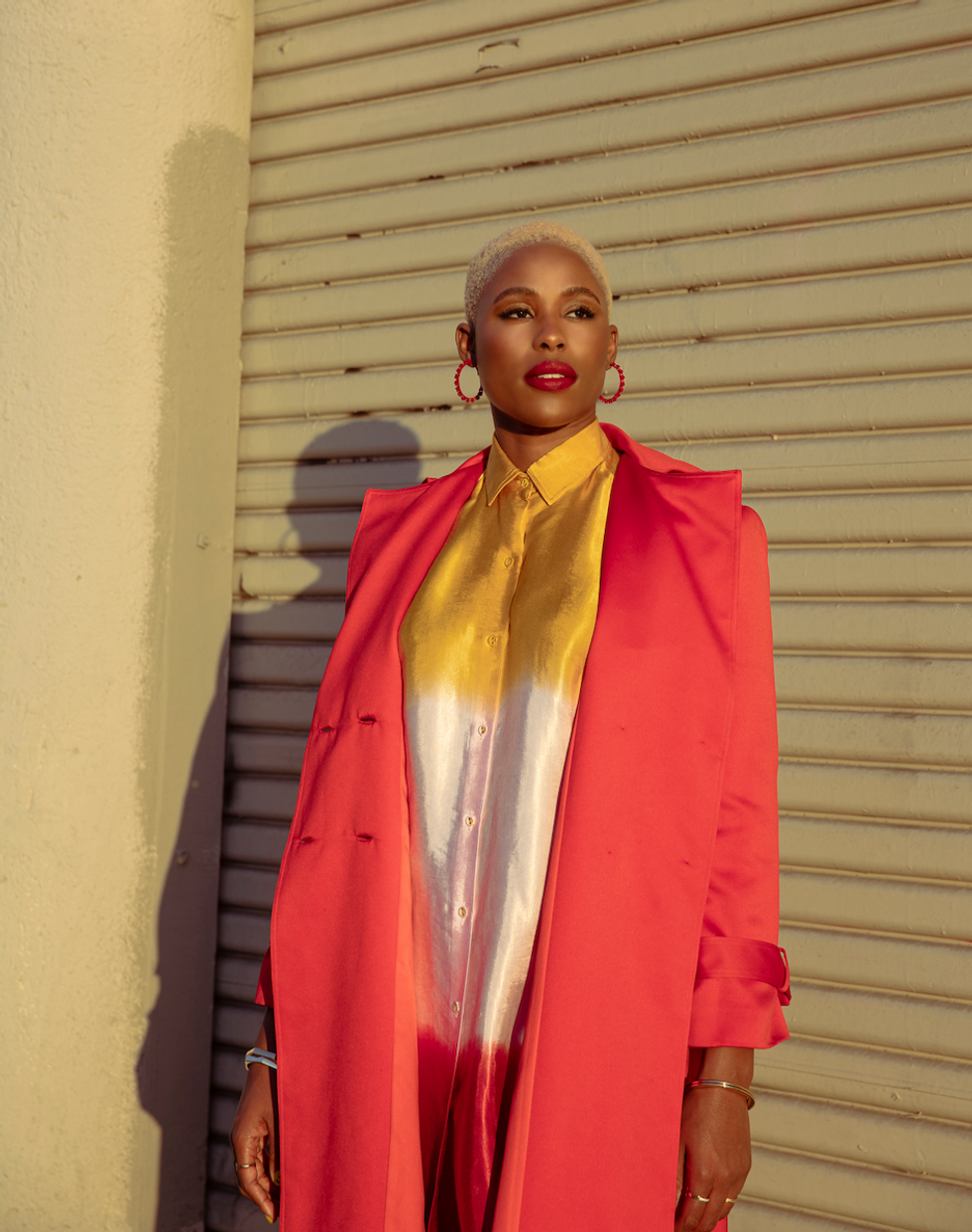
Cecile Boko
What is your motivation to keep working toward your goals?
I do this for my hood n****s. I feel like I haven’t seen a lot of people just doing it for the 'hood. Because I have transcended into different areas in my life, people assume that I have this certain way of living, but in reality, when I go back home, I go back to the 'hood. My main goal is to really heal the 'hood. There are so many things I have learned from where I came from.
We are so used to being consumers and there are people who still do not know how to economize or capitalize off of their gifts. We can really branch out into fields that we didn’t think were possible, similar to what Tye is doing in Harlem. We are so used to having limited resources, [so] we have been forced to be creative in so many different ways. I don’t care to make things for rich people. I care to be an inventor or a creator for my people in the 'hood that are trying to find a way to be better but keep getting pulled back into the same cycles.
What does success mean to you versus happiness?
I think success and happiness are directly correlated. I feel like success for me is living in my authentic truth. Success for me isn't attached to any worldly possession. All of that comes and goes. I’m interested in figuring out how I can elevate the human species, spreading light and joy, and getting to the truth about what our purpose is. When I reach that level of seeing the results of my manifestations, then that is what happiness means to me. I am able to share the information I have learned to others. I want everyone to know everything that I know.
Reflecting on where you are in life right now, what would you say to your younger self?
I would say that everything is going to be alright. Don’t be so hard on yourself, and allow yourself space—room to breathe. I didn’t have the luxury when I was growing up to not be in survival mode. People would also say I was "too much" of something. So I would internalize that and be cautious about how I came off to people. I didn’t want people to criticize or judge me for simply trusting my own instincts. I'd encourage her to give herself grace and to understand that she is not responsible for other adults' feelings or behaviors. In my adult life, I have been reparenting myself.
I would [also] say to my younger self, I love you. There are so many people who love you and will love you. Everything will happen for you and don’t be stressed out about the how or when. Celebrate the now!
For more of Jerrie, follow her on Instagram here.
Featured image by Cecile Boko
- Meagan Good's Looks Almost Cost Her The Starring Role In Her ... ›
- Meagan Good, Grace Byers, Harlem Amazon Prime - xoNecole ... ›
- A Look Back on 'Harlem' Season One - xoNecole: Women's Interest, Love, Wellness, Beauty ›
- Harlem Season 2 Review - xoNecole: Women's Interest, Love, Wellness, Beauty ›
Your December 2025 Monthly Horoscopes Are All About Surrender & Alignment
December is about letting go. We end the year with the need for more peace, reflection, and rejuvenation, and that is exactly what December is providing for us. The Sun is in Sagittarius, and anything is possible. This is the month to believe in that and to know that the universe is supporting you. With a Supermoon in Gemini as we begin the month as well, we have an opportunity to gain the closure we have been looking for this year and to wrap up old projects, ideas, and communication breakthroughs.
This is the month to make your peace the priority and let go of trying to control the way the tides are turning. Trust in your new beginning, and give yourself time to prepare for it this month.
A big part of the clarity that is coming through this month is due to Neptune going direct in Pisces on December 10, after being retrograde here since July. With Neptune now direct, we are able to see our inspiration and creativity a little more clearly, providing the perfect energy for dreams and manifestation to be built upon. The smoke is clearing, and it’s up to you to decide what you want to do with this newfound clarity that this transit is bringing. Mercury also moves back into Sagittarius on December 11, which is great for communication and clarity, and the adventures you were trying to see through at the beginning of November come around for you again with greater purpose and support.
On December 15, Mars enters Capricorn until the end of January 2026, and this is the extra push we need to make important changes and to be on the path towards greater abundance, stability, and prosperity. Mars in Capricorn takes care of business, and we have extra energy at our disposal during this time to do so. This transit is an ideal time to focus on your career or financial goals for next year and to start putting some of these plans into motion now. A few days later, we have the New Moon of the month, which will be in Sagittarius on December 19, and this is the perfect New Moon to manifest.
The energy is high, magic is in the air, and it’s all about moving forward with the new beginnings that are inspiring you and bringing you joy to think about right now.
Capricorn Season officially begins on December 21, and this earth sign energy is how we heal, gain closure, and build new foundations in our world. With Venus also moving into a Capricorn a few days later, there is something about peace, prosperity, and security that we are gaining in life and in love as we close out the year, and this is what we need right now. This month is about reflecting on what was, letting go of old hurt, and renewing. December is an ending and a new beginning in one, and there is magic in this space to be created.
Read for your sun and rising sign below to see what December 2025 has in store for you.
 AriesKyra Jay for xoNecole
AriesKyra Jay for xoNecoleARIES
December is a full-circle moment for you, Aries. You are seeing the gifts in your world and have a lot of gratitude for the way things have come about for you as of late. There are culminations in your world that are providing you with more abundance, stability, and community, and you are exactly where you are meant to be this month. With the Sun in a fellow fire sign and in your 9th house of travel for most of the month, December is a good time to get out of your comfort zone, explore the world around you, and get your body moving.
Mars, your ruling planet, also makes a change and moves into Capricorn on December 15, which will fuel your inspiration and power in your career space. You are making a lot of professional progress as we close out the year; however, make sure to be more mindful of your competitive drive right now. The New Moon on December 19 is the perfect opportunity for you to create some new plans and goals when it comes to traveling, education, and where you want to gain some new inspiration in your world. Overall, this is a month of things coming together for you serendipitously.
 TaurusKyra Jay for xoNecole
TaurusKyra Jay for xoNecoleTAURUS
December is about trusting your intuition, Taurus. You have a lot on your mind this month, and it’s best to delegate, communicate, and allow yourself some relief by opening up to someone and not feeling like you have to hold everything in. As we begin the month, we have a Supermoon in Gemini happening in your house of income, and the plans and projects you have been building here come to fruition for you now. This is the time to gain clarity on your financial world and to take a look at what spending habits you want to let go of here as well.
With Venus in your 8th house of shared resources for most of the month, you are doing a cleanse on your commitments, partnerships, and business ventures. You are taking a look at what you want to dedicate yourself to in the future, and what commitments you may need to let go of now in order to be in the space you truly want to be, both financially and within some of your relationship dynamics. Before we end the month, we have a New Moon in this same area of your chart, and it’s time to look at the opportunities that are presenting themselves and to trust your internal guidance system to lead you forward.
 GeminiKyra Jay for xoNecole
GeminiKyra Jay for xoNecoleGEMINI
You are moving forward fearlessly this month, Gemini. December is your month of love, passion, and dignity, and you are owning the light that you shine. We begin the month with the last Supermoon of the year, happening in your sign, and you are stepping up to the plate. You are showing up, owning how much you have grown this year, and allowing yourself to heal while also acknowledging that you have done your best and you deserve to have fun in the midst of the changes you are creating.
Mercury, your ruling planet, is officially out of retrograde, and you can use this energy to the fullest potential now. With Mercury in your 7th house of love, it’s time to speak from the heart and to talk about the things that matter and that are inspiring you right now to your loved ones. You never know what kind of epiphanies you may have when you open up the conversation to others. Before the month ends, you have a New Moon in this same love area of your chart, and this New Moon is all about manifesting romance, commitment, and abundance in your world.
 CancerKyra Jay for xoNecole
CancerKyra Jay for xoNecoleCANCER
December is an opening for more love, more joy, and more freedom in your life, Cancer. You have come to a place where you hold so much gratitude in your heart for where you are today and where your heart is shining, and things come together for you with more ease right now. With the Sun in your 6th house of health, work, and daily routines for most of the month, you are getting your ducks in a row while also putting more energy and effort into taking care of yourself, your priorities, and your well-being. This month surprises you in many ways, and it’s because you are showing up.
Mars and Venus both move into your house of love, relationships, marriage, and abundance this month, and you are making strides in your love life. You have both of these opposing forces on your side and are being recognized for the love you are while also receiving the love you want. This month, overall, is about focusing more on the positives in your world and letting your heart have its joy. Before December comes to an end, there is a New Moon in Sagittarius, and this is the perfect opportunity to create the plans you want to see through next year, especially when it comes to your work life, colleagues, business ventures, and health.
 LeoKyra Jay for xoNecole
LeoKyra Jay for xoNecoleLEO
The scales of karma are balancing, and they are balancing in your favor this month, Leo. December is your month of truth, and of seeing it clearly in your world. The Sun is in your house of romance, pleasure, and happiness for most of the month, and it’s time to relax, be in the present moment, and allow what is meant to be, to be. With a Supermoon in your 11th house of manifestation as December begins, this is a powerful month for seeing your dreams come to fruition, and for feeling like the intentions you have set this year are finally here for you now.
Mars also moves into your 6th house mid-month, and this is the perfect energy to have to move into the new year. You have extra energy at your disposal right now and are feeling fearless with what is possible for you and your daily routine. Before the month ends, we also have a New Moon in a fellow fire sign, Sagittarius, and this is a breakthrough moment for you and your heart. December, overall, wants to show you how loved and supported you are and will be doing so in magical, unexpected, and concrete ways.
 VirgoKyra Jay for xoNecole
VirgoKyra Jay for xoNecoleVIRGO
December is a month of victory, Virgo. You are showing up and experiencing some new successes in your world that move you forward on your path in life. With a Supermoon in your 10th house of career as we begin the month, the effort and intentions you have made this year come into full bloom, and you are being recognized for who you are and the good work you have done. This month is all about showing up and allowing yourself to be seen and loved, knowing that you deserve the support and opportunities you are receiving.
Mars moves into Capricorn on December 15, which brings the passion and excitement into your love life, hobbies, and little pleasures in life that light you up. You want to have fun this month and are going to be walking into the new year with this fearless, happy, and spontaneous energy within you. Before the month ends, Venus also enters Capricorn, and in this same area of your chart, you have a lot to look forward to and believe in right now. Overall, December wants you to be happy and will be doing everything possible to make that happen for you. This is your month to shine, Virgo.
 LibraKyra Jay for xoNecole
LibraKyra Jay for xoNecoleLIBRA
December is a month of opportunity for you, Libra. New doors open, and you are financially making breakthroughs this month because of it. December begins with a Supermoon in your 9th house, and you are getting a clearer view of where you have been making strides in your life and how it has all brought you here to this present moment of freedom. This month is showing you what happens when you are fearless with your purpose and when you believe in yourself and what you are worthy of.
Moving further into December, Mars moves into your 4th house of home and family mid-month, and you are closing out the year in your safe spaces. You are spending more time with your loved ones and taking the time to quiet your mind and listen to what your heart has been telling you. Before the month ends, we have a New Moon in Sagittarius, happening in an area of your life that deals with communication. This is a great time for getting the answers you have been looking for and for feeling more clear-headed and confident about the decisions you are making as you move into the new year.
 ScorpioKyra Jay for xoNecole
ScorpioKyra Jay for xoNecoleSCORPIO
Patience is a virtue this month, Scorpio. December is all about remaining patient and vigilant with what you are creating in your world, and knowing that the universe has your back. It’s time to be reminded of the power of hope, and this month is an opening to greater clarity in your life. There is a lot of energy in your financial zones right now, and this is providing you with new opportunities and new insight; however, the speed at which things come about for you may feel daunting. Keep your head up and eyes focused on what you want and know that you are more than worthy of receiving it.
With Mercury in your 2nd house of income this month, December is a good time to plant new seeds and to think about where you want to be financially a month from now or even a year. This month is asking you to think bigger and to think more long-term so that you can set the appropriate plans into motion now. We also have a New Moon in your house of income before the month ends, and this is when you will see more of your dreams come to fruition in this area of your life, and have more opportunities to build. Overall, December will be teaching you a lot, Scorpio.
 SagittariusKyra Jay for xoNecole
SagittariusKyra Jay for xoNecoleSAGITTARIUS
Sagittarius Season is here, and there is a lot in store for you this month, Sag. December is all about what you are dedicating yourself to. It’s about setting your intentions and putting the work in to back up your dreams, and about getting things in order so that when the new beginnings come, you are ready for them. The Sun and Venus are in your sign for most of this month, and there are a lot of eyes on you right now. You have the potential to create a new beginning for yourself, and it’s time to invest in yourself, your love life, and your dreams.
Mercury moves into Sagittarius on December 11, and this is giving you another opportunity to see through some of the plans that you had initiated in November. Mercury was retrograde in your sign last month, and there may have been some disruptions to your vision and plans for the future, and now this energy is turning around for you. Before the month ends, we also have a New Moon in Sagittarius, and you are walking through new doors fearlessly. You are catching others by surprise by your growth this month, and you are thinking a lot about your purpose, future, and plans for the new year.
 CapricornKyra Jay for xoNecole
CapricornKyra Jay for xoNecoleCAPRICORN
December is all about the vision, Capricorn. You are moving through a lot of changes and transformations this month, yet they are giving you a chance at a new beginning in the process. You are focused more on the future and what goals you want to manifest for yourself right now, and are ready to let go of what hasn’t been working for you. With the Sun in your 12th house of closure for most of December, this is your time for healing, but remember, healing doesn’t have to be isolating or boring; you can thrive while you renew, and you are this month.
Mid-month, the excitement picks up for you, and you are feeling more energized than you have in a while. Mars moves into Capricorn until the end of January 2026, and you are being proactive with your goals, intentions, and passions. You are a force to be reckoned with this month, and you are making things happen for yourself with confidence. Capricorn Season officially begins on December 21 this year, and this is definitely speeding up your healing process. You are breaking free from what was, and with Venus also moving into Capricorn before the month ends, you are leaving this year in high spirits and with love opening a new door for you.
 AquariusKyra Jay for xoNecole
AquariusKyra Jay for xoNecoleAQUARIUS
December is all about community, creativity, and manifestation, Aquarius. This is the month to work together with others to help bring your dreams to life. You are in a space of inspiration, empowerment, and beauty, and are creating more of this energy around you and in your world. Look out for what support comes your way this month and know that you don’t have to do everything alone to succeed. With the Sun in your 11th house of manifestation and friendship, your intentions are coming to fruition, and it’s time to celebrate with the people you love and to own how far you have come this year.
On December 19, we have a New Moon in Sagittarius, lighting up your life in all of the best ways possible. This is your New Moon of freedom, victory, and magic, and you are seeing new beginnings appear that you were once just hoping for. Before the month comes to an end, Venus moves into your 12th house of closure, and after an active and successful month, you are ready to relax, heal, and give your heart some of the attention it has been asking for. You are moving into the new year with the need to release and renew what hasn’t been working in your relationships, and you are finally ready to.
 PiscesKyra Jay for xoNecole
PiscesKyra Jay for xoNecolePISCES
December is a big month for you, Pisces. You are making some huge accomplishments this month, and are feeling like everything you have been through this year has been worth it for these moments that are coming to fruition for you now. The Sun is in your 10th house of career and reputation for most of the month, and this is where a lot of your focus is right now. You are claiming your successes and putting yourself out there in ways that not only serve you, but that inspire others as well.
Neptune officially goes direct on December 10, after being retrograde in your sign since July, and you are finally seeing things a little more clearly. You are feeling renewed inspiration and passion in your life, and your intuition is your strongest asset right now. Before December comes to an end, we also have a New Moon in your 10th house of career, and what happens now not only changes things for you in the present, but it also opens new doors and what is possible for you in the new year as well. Overall, you are on top of your game this month and are owning the joy and empowerment you feel.
Featured image by Kyra Jay for xoNecole
Skincare Hacks That Actually Make Hyperpigmentation...Worse
Something that I wish I had learned back when I was experiencing more breakouts than I do at this point in my life is the difference between hyperpigmentation and actual acne scars. Although people oftentimes believe that they are one in the same, that actually isn’t the case.
Yes, both can result in darker marks on your skin; however, while hyperpigmentation can change the color of it, scars often also alter your skin’s texture. And yes, it’s important to know the difference between the two because, that way, you know how to treat each issue.
Since the focus today is on hyperpigmentation, let me break that down a bit further. Basically, what gives your skin pigment is melanin. Well, when your skin cells end up getting damaged or injured, oftentimes your body’s response is to create more melanin as a part of the healing process. Problem is, sometimes your system overproduces melanin, and that can lead to darker patches of skin. This can especially be the case for our skin since we naturally produce more melanin anyway.
When hyperpigmentation transpires, we usually want to get rid of it as soon as possible. And while doing things like applying sunscreen, using skin lightening products, and even taking certain vitamins can help — the main thing to do is incorporate a gentle skincare regimen and then use patience with it. If you don’t and you go overboard in your approach, you could look up and end up with hyperpigmentation issues that are far worse (and longer lasting) than they were to begin with.
How? I’ll explain.
Using Products That Create Breakouts
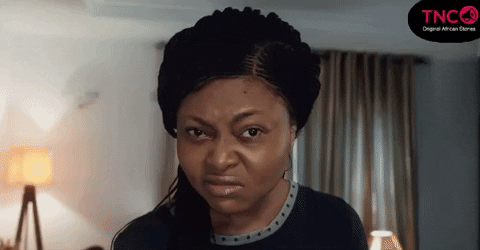 Giphy
GiphyWho likes getting a pimple? For me, though, what pisses me off to no end is that there is about a 70 percent chance that if one pops up, some sort of hyperpigmentation is going to be left behind whether I mess with it or not. Ugh. The reason why is because zits bring inflammation and inflammation can trigger hyperpigmentation.
So, you know what that means, right? It’s important to do all that you can to avoid getting a pimple in the first place and that includes not using products that will clog up your pores or irritate your skin like lanolin, thick butters (especially on your face), mineral oil, D&C coloring, a fatty acid called isopropyl palmitate — these are a few things that can lead to breakouts, if you’re not careful. That’s why it’s always a good idea to read the labels of the things before purchasing them.
Oh, and when it comes to things like shea and mango butter, it’s usually best to use them on other parts of your body than your face (because your face is more fragile than, say, your arms or legs).
Doing Too Much Exfoliating
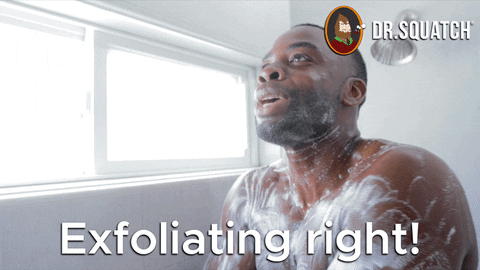 Giphy
GiphyI am a fan of DIY chemical peels; so much so that I wrote an entire article about it a couple of years ago (check out “I've Been Doing At-Home Chemical Peels. Here Are The Pros And Cons.”). The things that I like most about them are they are a super-effective way to exfoliate and even out my skin tone. That said, though, be careful with doing too much exfoliating whether it’s via a chemical peel, a skin scrub or even dry brushing.
Not only can over-exfoliating irritate your skin, it can dry it out, cause lots of skin flakes, lead to inflamed skin — and all of this can result in hyperpigmentation as your skin is in the process of “getting back to normal.” So, just how often should you exfoliate? Unless your skin is really oily, 1-2 times a week is more than enough (2-3 if it is on the oily side).
Layering with Too Many Products
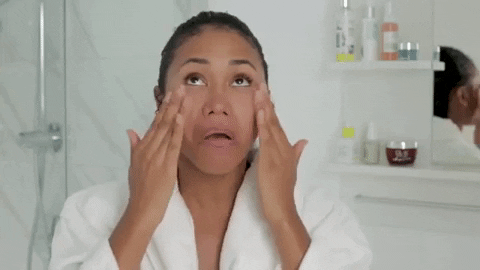 Giphy
GiphyOh, I know — if you watch too many of those TikTok and Instagram videos where women are applying 6-10 products on their face before adding any make-up to it, it can tempt you to follow suit. Use some caution with that, though. Each skincare product comes with its own list of ingredients and every time you add something else that has another set of ingredients onto it, that increases the chances of you irritating your skin or causing it to break out.
My two cents would be to ease into each product. Start with one thing and, if it’s all good (after about a week or so), incorporate another. Oh, and try to keep it down to 3-5 skincare products tops. When it comes to effective skin routines “less is more” is a motto to live by. Otherwise, redness, flaking and hyperpigmentation may be in your future.
Using Skincare Products That Contain Fragrance
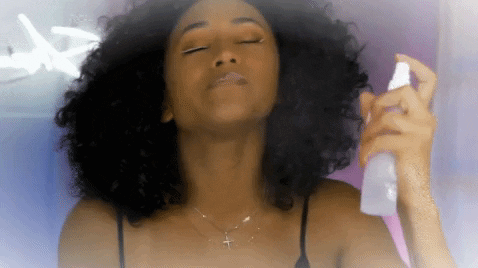 Giphy
GiphyAlthough applying skincare products that have a nice scent to them can cause your skin to smell amazing, sometimes they can be both an irritant as well as an allergen — and that can cause your skin’s barrier to weaken or become really irritated. And again, whenever your skin is damaged in some way, the recovery process can lead to hyperpigmentation. So, it really is best to avoid scented skin products at all costs (if you want flawless skin, that is).
Applying Too Much Heat
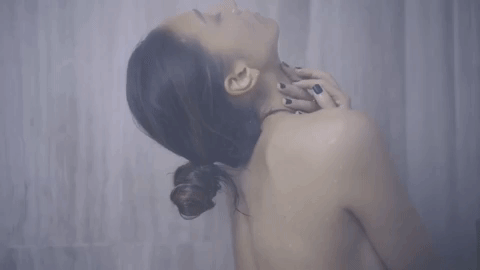 Giphy
GiphyBet you didn’t see this one coming. How about increased blood flow, over time, can lead to hyperpigmentation. Basically, it’s because of the fact that, sometimes, too much consistent blood flow can result in skin inflammation and, as we already discussed, when the body is healing from inflammation, that can sometimes cause hyperpigmentation to occur.
The takeaway here: use sunscreen when you’re outdoors and try to keep those scorching hot showers to a minimum. Being in warm water for between 7-10 minutes is ideal.
Not Testing Products (Especially Acids) on Your Arm First
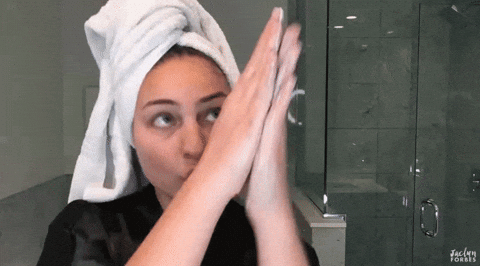 Giphy
GiphySomething that definitely keeps my skin glowing is certain acids: hyaluronic acid, mandelic acid and kojic acid soap (oh and some vitamin C extract too), especially. All of these are pretty good on darker skin tones; however, because we all are different, before applying any acid to your skin, make sure to test it on your arm first (and wait 48 hours, just to be sure that the coast is clear).
Trust me, I know of what I speak because I once tried some pretty potent pineapple extract on my face once and it mildly burned the lower part of my right cheek to the point where it took about four months before everything turned back to normal. Hmph, if I can keep anyone from experiencing that drama, I absolutely will.
7. Experimenting with Harsh Essential Oils
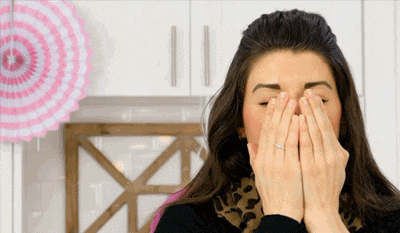 Giphy
GiphyListen, if you want a zit to go away, damn near overnight, apply some tea tree oil to it. Just make sure that you dilute it with a light carrier oil (like grapeseed, jojoba or rosehip oil) first. Why? Oh, I have learned from very up close and personal experience that certain essential oils can also burn your skin and, as we’ve already discussed, ad nauseum at this point, damaged skin typically results in hyperpigmentation on some level. Yeah, essential oils are a blessing. They are also nothing to play with. Dilute, dilute, DILUTE.
___
You know, they say that it can take several weeks, if not many months, for hyperpigmentation to totally fade away. Hmph. To me, that’s even more incentive to do all that you can to avoid it transpiring in the first place — and that includes NOT incorporating counterproductive skincare routines and regimens.
The more you know, sis. For real.
Let’s make things inbox official! Sign up for the xoNecole newsletter for love, wellness, career, and exclusive content delivered straight to your inbox.
Featured image by Shutterstock



